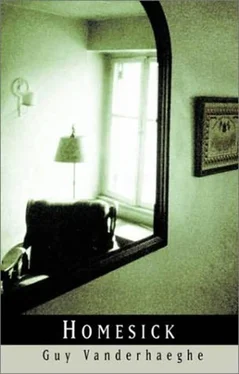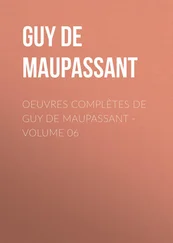So get him one, Vera thought. Do I look like a mother?
“He’s not happy,” her father added.
Vera had always been his blunt and fearless child. “Little wonder,” she said.
“What the hell’s that supposed to mean?”
“You ought to quit riding him around the country at night. That’s what I mean.”
“Watch your step, miss.”
“You don’t want to know – don’t invite me to tell.”
For the moment she could see he was ashamed. Well, he ought to be. Doing as he did. Sometimes she truly believed he’d gone clean off his head. When her mother was alive Vera had never seen him drunk even once. Not at a wedding, not at Christmas, not at New Year’s. Now, once a month, regular as clockwork, he could be expected to go on a scandalous rip, using whisky to light a fire in his belly against the encroaching darkness.
Drunk he was a different man, a lunatic. Stumbling and ranting, he would kick in the pickets of the front fence, rampage through the garden, tearing up all the stalks of new corn, roaring that winter was coming, get the corn in, even though it was only June. One night he wrenched all the cupboard doors off their hinges, trampled them to splinters under his boots, and fed them into the woodstove. With the stove lids left off, Vera was sure the house would catch. Every time a gust of wind whistled down the chimney and twisted its way through the tin pipes, the fire blazed up roaring and spitting sparks. As she tried to push the stove lids back into place with a broom handle, leaning back from the flame and heat, Vera thought she heard her father whisper, “Let’s see her slam the sonofabitching cupboard doors now, Earl.”
These things were terrible but worse were the nights when Monkman stood swaying at the foot of the stairs, clinging to the banister and shouting for Earl to get himself dressed, they were going for a ride. Those nights his daughter wished him dead.
Vera did all she could to prevent him taking Earl. She offered herself in her brother’s place. “Take me, Daddy,” she would coax. “You don’t want Earl. Take me.”
He never listened. “I want my boy!” he bellowed up the stairs. “Goddamn it, Earl, get up and get yourself dressed! I want some company for a drive!”
“You’ll kill him, Daddy, driving drunk. Don’t,” Vera pleaded. “One of these nights you’ll roll that old truck and kill him.”
Her father could not tell her that he took Earl because he knew that with Earl in the cab he would not permit himself to swing the wheel off the road, hard into the ditch and the racing darkness. Instead, he said, “Earl and me are different from you, Vera. We’re alike. We’re sad and we need each other.”
“ You’re not sad. You’re just sorry for yourself and drunk. That’s all.”
“Your daddy is as sober as a judge, Vera.”
Her father carried Earl off at any possible hour – midnight, one in the morning, two. In such a state he was no respecter of anyone’s sleep. All that mattered to him was the headlong rush down a country road, the old truck pressed to the limit, the speedometer needle shaking like a trembling finger. Earl sat beside him rigid and glassy-eyed as any rabbit locked in the glare of oncoming headlights. The noise was deafening. The cab of the truck rattled and groaned and squealed. Stones spurting up against the floorboards made a crazy, ragged drumming, a drumming punctuated by the steady slap slap of the glove compartment with the broken catch flapping up and down on its hinges. The sight of the dark, flat land spinning by on either side robbed Earl of the power of speech. Even when a tire caught loose gravel and the truck lurched violently from side to side, the fields suddenly swinging towards him heavy and full of menace, he couldn’t holler – only lock his knees and brace his arms against the dashboard, while in his mind’s eye he imagined the truck hurtling over and over, the gas tank slopping gasoline, the windows showering glass.
It was out of fear of darkness that Alec drove. In the beginning of his crazy drives, when he was drunkest, he lost the fear, knew only abandon, release. Ever since the death of his wife the oppression and misery of night had lain heavy on him. Night work was not cure enough. When darkness fell, he grew anxious. He fidgeted, could not keep still. Everything drew in on him, shrank. It was like being squeezed and choked in a tight black suit cut for a smaller man. Monkman feared to see the world of day recede, people and buildings shut off from view. Hated the withering away – to a street, to a house, finally to one lighted room in which he sat with a ticking clock. It started him drinking, the thought of the darkness eating up the world, gnawing it smaller and smaller.
It was this which sent him out into the country. As many times as he went, as many times he was convinced this was the way to beat it. Tearing along the narrow roads helped push back what threatened him. Mile after mile he rolled up the great carpet of darkness with his headlights and proved to himself nothing had been taken away forever, the earth was still there, as it had been. That was what he needed, wanted, when the night gathered in, to know nothing had changed. But the relief was only temporary, a drug compounded of speed and drunkenness. Lacking one or the other, it was nothing. So as he sobered, the elation drained away and the old unease filtered back. He began to see danger, to understand the durability of darkness. His hands went slick with sweat as the road tilted and swayed beyond his windshield. All went slippery and untrustworthy on him: road, tires, steering wheel.
He made himself stop the truck. When he turned off the engine and killed the lights land and sky knit solid black against him. His mind ran back over all those places on the road where a mistake might have killed them. Nothing in the world could bring him to turn his truck around and go back over those places while it was still night. In the dark, he was sure he would make that mistake.
When the truck halted, Earl knew it meant the fire. His father didn’t have to say a word. Whatever they foraged out of the ditches was piled on the hard-packed surface of the road, rotten fence posts, dried Russian thistle, beer boxes. “Bigger, bigger,” his father urged, as they stumbled through the dark in a frenzy, filling their arms with water-killed willow, a smashed turkey crate, a weathered fir plank fallen off a load of lumber. Some nights the flames roared and blustered ten feet high, submerging the stars in a fizz of sparks. His father stood as close to the bonfire as he could bear, so close that Earl wondered his shirt didn’t begin to curl and smoke.
“There’s nothing like fire,” his father said, “to take the cold and darkness away. Is there, Earl?”
The sun rose on charred sticks, ashes, and Earl asleep in the truck. Only with daybreak did Monkman trust himself to start the engine and return to Connaught. In first light and the cold of dawn he wrapped his arms around himself and scattered the remains of the fire up and down the road with his boots. Then he crept home, driving painfully slow and careful so as not to disturb the sleep of his son, who, nevertheless, from time to time, spoke out in his dreams.
Monkman knew what awaited him. Vera. Vera in her mother’s housecoat, looking sallow and hollow-eyed. It bothered him to see her so, in her mother’s housecoat. Many a time he had almost brought himself to speak to her about her wearing of it. It wasn’t respectful or right the way she had gone into her mother’s closet and helped herself. To see her sashaying and promenading around in it, trailing ash and cigarette smoke like the Queen of Sheba, particularly galled him. Smoking was not a habit Martha had indulged in, or approved of.
Читать дальше












